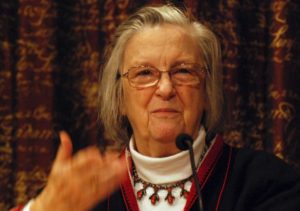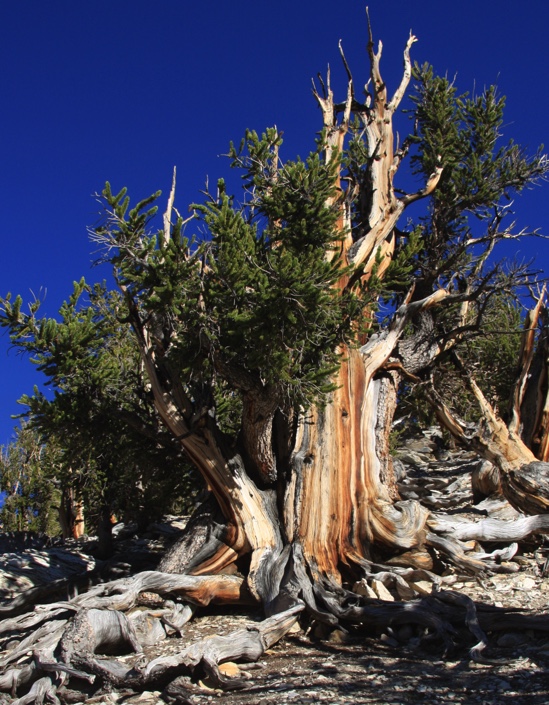The idea that tragedy always results when common resources are exploited became dogma in the environmental world when Garrett Hardin published his essay, Tragedy of the Commons, in 1968. Not so fast, said Elinor Ostrom—and she proved it.
Elinor Ostrom was born in Los Angeles on August 7, 1933 (died 2012). She was the only child in a poor family, but her family lived just outside of Beverly Hills. As a girl, she planted Victory gardens and knitted scarves for soldiers, a foreshadowing of her interest in community. Her mother arranged to get Elinor enrolled in the Beverly Hills High School, mixing with her privileged neighbors. She said this was fortunate, partially because she assumed, like her classmates, that she would go to college, and partially because she was able to join the debate team, learning that every argument had two sides.
She did go to college, graduating from UCLA in three years and then added a Master’s degree in 1962 and a doctorate in 1965, all in political science. Married two years earlier, she moved with her husband (and life-long research partner, Vincent Ostrom) to the University of Indiana, where he had landed a professorship. Ostrom took a temporary teaching position, covering 7:30 AM classes that no one else would teach. The university soon recognized what they had and offered her a regular appointment. She stayed at Indiana University her entire career, rising to named professorships and to be departmental chair.

She was not satisfied that Hardin’s “tragedy of the commons” sufficiently described actual conditions in the world. “Relying on metaphors as the foundation for policy advice,” she wrote, “can lead to results vastly different from those presumed to be likely.” So she went into the field to see what was happening in resource-dependent communities, studying water use, fisheries, forestry, grazing and other resources. Her work ranged across the globe, with studies on every continent except Antarctica.
Everywhere she looked, Ostrom found communities that had managed to exploit natural resources for generations, sometimes centuries, without destroying the resources and suffering the resultant hardships. She found that these small communities developed sensible ways to share resources, without resorting to private ownership or top-down governmental control. She described her understanding in her now-classic book, Governing the Commons, in 1990. The key is communication within the community, so individuals can gather to discuss their personal and group interests and develop a strategy that works for them. Decisions get made locally, group after group, which she called “polycentrism.” What works in one place might not work in another, and pretending that a simple theory—based on attractive but perhaps misleading parables of grazing on a commons—explained human behavior was an error. “No panaceas,” she often said.
She built her research around the same sense of community. With her husband, Ostrom developed the Workshop in Political Theory and Policy Analysis at Indiana University. The name suited their style, to bring people from different backgrounds—disciplines, resources, nations—together to consult and learn. The group met with their genial hosts and mentors in a cottage-like facility, informal and unregulated, mirroring the findings of their research. They used empirical research to inform their ideas and tested those ideas with more field work. The approach was essential, she wrote,
“If the research that one wants to pursue can all be done sitting in a library carrel somewhere in one’s home institution, then one does not need to develop the equivalent of a Workshop. However, if one is trying to understand and test theory in the field and in the experimental lab and to really pursue in-depth studies of diverse institutional arrangements around the world, then working with colleagues located in diverse settings at various stages of their careers is crucial for making scientific progress.”
Both her research and approach caught on. Including the human component into the understanding of natural resource management has become known as “social-ecological systems.” Over the years, Ostrom grew to be an international leader in this emerging discipline, with more than 25 major awards and 12 honorary doctorates. She was president of the American Political Science Association during 1996-1997, and was elected to the National Academy of Sciences in 2001.
Her crowning accomplishment, of course, was her recognition as the Nobel Laureate in Economic Sciences in 2009 (co-awarded to Ostrom and Oliver E. Williamson). She was the first woman to win the Nobel, but more interestingly, the first non-economist to do so. At the conclusion of her Nobel lecture, Ostrom summed up her vision:
“The most important lesson for public policy analysis derived from the intellectual journey I have outlined here is that humans have a more complex motivational structure and more capability to solve social dilemmas than posited in earlier rational-choice theory. Designing institutions to force (or nudge) entirely self-interested individuals to achieve better outcomes has been the major goal posited by policy analysts for governments to accomplish for much of the past half century. Extensive empirical research leads me to argue that instead, a core goal of public policy should be to facilitate the development of institutions that bring out the best in humans.”
References:
McCay, Bonnie J. and Joan Bennett. 2014. Elinor Ostrom, 1933-2012. National Academies of Science. Available at: http://www.nasonline.org/publications/biographical-memoirs/memoir-pdfs/ostrom-elinor.pdf. Accessed June 7, 2018.
Nolen, Jeannette L. Elinor Ostrom, American political scientist. Encyclopedia Britannica. Available at: https://www.britannica.com/biography/Elinor-Ostrom. Accessed June 7, 2018.
Ostrom, Elinor. 2009. Beyond markets and states: Polycentric governance of complex economic systems. Nobel Prize Lecture, December 9, 2009. Available at: https://www.nobelprize.org/nobel_prizes/economic-sciences/laureates/2009/ostrom_lecture.pdf. Accessed June 7, 2018.
Ostrom , Elinor. 2009. Elinor Ostrom – Biographical. Nobel Prize Organization. Available at: https://www.nobelprize.org/nobel_prizes/economic-sciences/laureates/2009/ostrom-bio.html. Accessed June 7, 2018.
The Economist. 2012. Elinor Ostrom. The Economist, Jun 30th 2012. Available at: https://www.economist.com/node/21557717. Accessed June 7, 2018.

